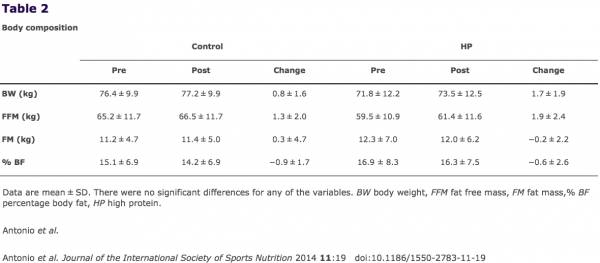When it comes to protein consumption, you’re likely to hear opinions all over the place, from the “it’s all supplement company propaganda” camp to the “more protein is always better” camp. A study in the Journal of the International Society of Sports Nutrition compared a fairly normal protein intake recommendation to an extreme one to see what would happen.
Forty resistance-trained men and women were chosen for the study. They had a lot of experience, averaging nine years of training, and also worked out quite a bit, with an average of 8.5 hours per week spent in the gym.
The participants were split into two groups. The control group was instructed to keep doing what they were doing. They exercised and ate the same as usual. The other group was told to keep exercising and eating the same way as before, with one exception. They were to eat more protein, to the tune of two grams per pound of bodyweight. They averaged just over 300 grams of protein per day.
Now, this study didn’t have the greatest precision, which is a good and bad thing. The good of it is that it represents as close to what people might actually do in their regular lives with the general instructions, “Don’t change anything except the protein.” Regardless, some of the other nutritional factors did change, like carb intake in the high-protein group. To shake things up further, ten of the subjects dropped out.
Even worse, the supplement companies that provided protein powder for use by the high-protein group sponsor the Journal’s conferences. That might not sound like a big deal, except the primary researcher is also the CEO of the Journal. I’ll let you read the results here and decide if there was any bias.
The results were that the high-protein diet resulted in exactly zero significant change. The conclusion of the researchers was in line with the results: there was no effect of increased protein intake. The high protein intake didn’t cause the participants to build muscle, so there’s no reason to consume an extreme amount of protein.

However, that’s not the biggest surprise. The real conclusion of this study is the fact that there were no changes in fat mass, which is pretty shocking. The high-protein group consumed an extra 800 calories per day, every day, for eight weeks, and didn’t get significantly bigger in any way. In fact, they even lost a little bit of fat.
Perhaps for an individual who needs to add more calories to his or her diet, protein might be a safe way to do so without the worry of storing extra fat. The researchers noted that for less experienced trainees, the results would have likely been more favorable for the high-protein group if the diet was higher in protein but similar in calories.
Evidence suggests that high-protein diets are healthy and effective. Ultimately, there doesn’t seem to be a great reason to go extreme with your protein consumption, but interestingly, there doesn’t seem to be much of a dietary reason not to.
References:
1. Jose Antonio, et. al., “The effects of consuming a high protein diet (4.4 g/kg/d) on body composition in resistance-trained individuals,” Journal of the International Society of Sports Nutrition, 11:19, 2014.
Photo courtesy of Shutterstock.






